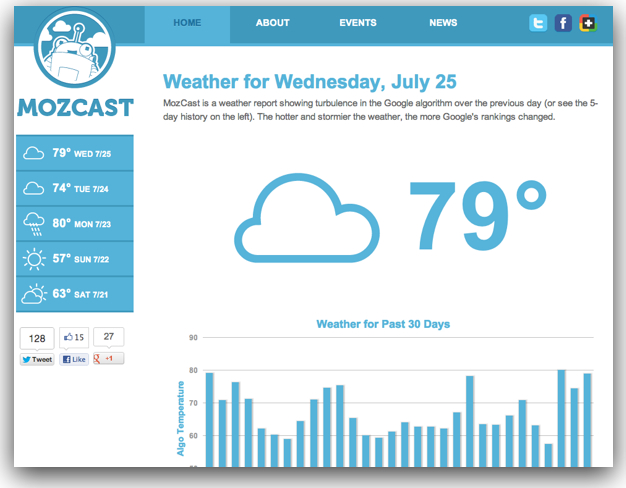My notes from the presentation “A Secret Algo Project Launch” at MozCon 2012 by Dr. Peter J. Meyers, Rogue Scientist for SEOmoz (@dr_pete). Be sure to read until the end for an amazing announcement from SEOmoz!
Background: http://mz.cm/algo-history SEOmoz history of Google algo changes.
We know so much about Google’s algorithm…but tons more we don’t know. “As bad as you think it is with Google algo changes…it’s 100 times worse.”
There have been 20 named updates from 2003-12. Do we really think they’ve only updated twice a year? Eric Schmidt’s testimony to congress last year forced him to be more forthcoming: 516 changes in 2010. 8000+ side-by-side experiments. 2800 live click evaluations.
There is What Google Says vs. What We Observe
What Google Says
- Clues from patents (see writings of Bill Slawski). Hard to know if a patent is actually used or is just to protect something for competitive purposes. May be something Google wants to do but don’t have the technology to do yet. Even if it does come into the algo, we don’t know when it did.
- Spokespersons and social shares by Google. How are we to parse the often sparse and ambiguous language?
- Search Quality Highlights started last November. So much info, but how much is it just a distraction? This may be part of the game; feeding us to keep us happy and off balance.
- Panda: 16 known updates in 17 months (3 major / 13 minor). Are we starting to get numb to them?
- How “minor” is a minor update? Example: “tweaks to handling of anchor text” “keyword stuffing classifier improvement.” These could be monumental…or nothing. We don’t know.
What We Observe
- Webmaster “chatter.” www.webmasterworld.com.
- Localization and personalization changing the game. So we aren’t all observing the same changes.
- Cat and mouse games. “Google Mocks Me for Missing Panda 3.5” by Barry Schwartz. Matt can say “nothing happened” on days when something definitely did happen.
- What’s normal and what’s abnormal for Google? If we don’t know what a normal day for Google is like, how would we recognize a truly crazy day? Dr. Pete built an Algo Alert project that watched top 10 rankings for 1000 KWs every 24 hrs (de-localized and sampled across 5 volume “bins”). Measures deltas (rate of change). May 12 was a “normal” day. April 24 (Penguin) you can see the difference. Everything moves. Proved validity of their algo alert. On Penguin day, there were way more “winner” sites than “losers,” but that shouldn’t be! W & L should be equal, and didn’t Penguin suck? It’s because tons of sites moved up only because a few sites at the top dropped out.
But then Dr. Pete observed a disturbance in the force on June 4, 2012 in the alert. Soon after he began to hear from others who thought they observed what we’ve come to call “Bigfoot.” Domain diversity in top 10 dropped. Multiple domains got a 2+ rank boost. Domain diversity in top rankings dropped 2.6% after Bigfoot. Important to note: Google has never acknowledged the existence of Bigfoot. Drop in diversity was as big as one for Penguin.
Dr. Pete doesn’t think this was a goal of Google, but rather an unintended consequence of Penguin.
More volatility:
- In June, five domains dominated the top 10 results.
- Panda 3.7 started June 9 and for 3 consecutive days out-flexed Penguin in effect.
- June 18 Mystery Update that also topped Penguin on par with Panda 3.7. Google said that day, “no update.”
Next question: is it just bounce (something changing and then later changing back)? Pete says no, the changes are permanent. This is rapid, long-term change. In some of the most volalitile KWs (“stocks to buy”) the change was like a complete overthrow in the SERPs over 10 days.
So a “normal” day in May-June was 79.7% of SERPs changing every 24 hours!
Other fun facts:
- Monday is the busiest day for changes.
- Medium-low volume KWs highest flux.
- Many major events go unnoticed and unnamed.
- Panda 3.9 July 24 was not the biggest change that happened that week.
Introducing MozCast
Should we chase the algorithm? Dr. Pete agrees with all the MozCon speakers who said don’t rely on Google SEO-chasing, do content and other things. The problem is that most in the room still aren’t doing that; these algo changes hit our clients hard.
But…The Google algo is our best portal to all of human knowledge right now. Google controls 60% of our access to our own knowledge. So we have a responsibility to hold the algo responsible, to make it have cold sweats at night because it knows we’re hunting it.
MozCast is now live. It is a Google weather report to show how much turbulence occurred in the algorithm on any given day. @mozcast will tweet each day’s weather.



Cute. I love how companies like HubSpot and SEOmoz use titles like “rogue scientist” to attract attention. (oh brother) What’s your title, Mark?